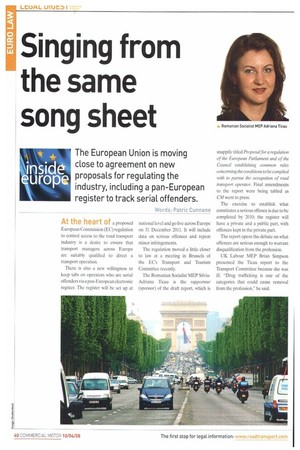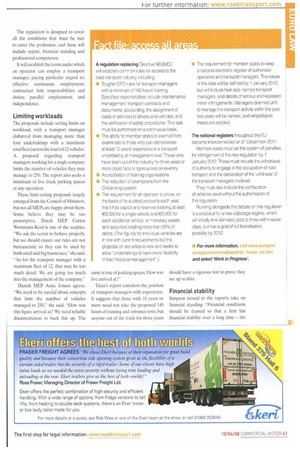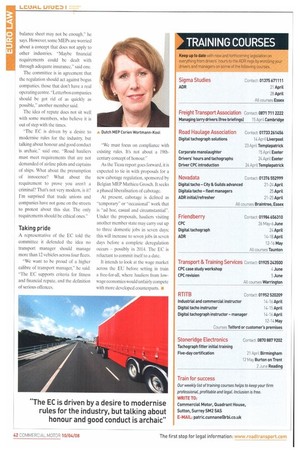Singing from the same song sheet
Page 40

Page 41

Page 42

If you've noticed an error in this article please click here to report it so we can fix it.
The European Union is moving close to agreement on new proposals for regulating the industry, including a pan-European register to track serial offenders.
Words: Patric Cunnane At the heart of a proposed European Commission (EC) regulation to control access to the road transport industry is a desire to ensure that transport managers across Europe are suitably qualified to direct a transport operation.
There is also a new willingness to keep tabs on operators who are serial offenders via a pan-European electronic register. The register will be set up at national level and go five across Europe on 31 December 2011. It will include data on serious offences and repeat minor infringements.
The regulation moved a little closer to law at a meeting in Brussels of the EC's Transport and Tourism Committee recently.
The Romanian Socialist MEP SilviaAdriana Ticau is the rapporteur (sponsor) of the draft report, which is snappily titled Proposal for a regulation of the European Parliament and of the Council establishing common rules concerning the conditions to be complied with to pursue the occupation of road transport operator. Final amendments to the report were being tabled as CM went to press.
The exercise to establish what constitutes a serious offence is due to be completed by 2010; the register will have a private and a public part, with offences kept in the private part.
The report opens the debate on what offences are serious enough to warrant disqualification from the profession.
UK Labour MEP Brian Simpson presented the Ticau report to the Transport Committee because she was ill. "Drug trafficking is one of the categories that could cause removal from the profession," he said. The regulation is designed to cover all the conditions that must be met to enter the profession, and these will include repute, financial standing and professional competence.
It will establish the terms under which an operator can employ a transport manager, paying particular regard to: effective continuous employment: contractual link; responsibilities and duties; parallel employment; and independence.
Limiting workloads
The proposals include setting limits on workload, with a transport manager disbarred from managing more than four undertakings with a maximum total fleet (across the four) of 12 vehicles. A proposal regarding transport managers working for a single company limits the number of vehicles they may manage to 250. The report also seeks a minimum of five truck parking spaces at any operation.
These limit-setting proposals largely emerged from the Council of Ministers, but not all MEPs are happy about them. Some believe they may be too proscriptive. Dutch MEP Corien Wortmann-Kool is one of the sceptics.
We ask the sector to behave properly, but we should ensure our rules are not bureaucratic so they can be used by both small and big businesses," she said. "As for the transport manager with a maximum fleet of 12. that may be too much detail. We are going too much into the management of the company."
Danish MEP Anne Jensen agrees. "We need to be careful about concepts that limit the number of vehicles managed to 250," she said. "How was this figure arrived at? We need reliable documentation to back this up. The A regulation replacing Directive 96/26/E0 MI establish common rules for access to the road transport industry, including:
a Tougher CPC rules for transport managers with a minimum of 140 hours' training. Specified responsibilities include: maintenance management, transport contracts and documents: accounting: the assignment of loads or services to drivers and vehicles; and the verification of safety procedures. This task must be performed on a continuous basis.
• The ability for member states to exempt from examinations those who can demonstrate at least 10 years' experience in a transport undertaking at management level. Those who have been out of the industry for three years or more could face a rigorous test on re-entry.
• Accreditation of training organisations.
• The reduction of exemptions from the 0-licensing system.
10 The requirement for an operator to prove, on the basis of its audited accounts each year, that it has capital and reserves totalling at least €9.000 for a single vehicle and €5,000 for each additional vehicle, or monetary assets and securities totalling more than 50% of debts. (The figures for individual vehicles are in line with current requirements but the proposal on securities is new and seeks to allow "undertakings to have more flexibility in their financial management")
same is true of parking spaces. How was five arrived at?"
Ticau's report considers the position of transport managers with experience. It suggests that those with 10 years or more need not take the proposed 140 hours of training and entrance tests, but anyone out of the trade for three years • The requirement for member states to keep a national electronic register of authorised operators and transport managers. The nature of the data will be defined by 1 January 2010, but will include fleet size, named transport managers, and details of serious and repeated minor infringements. Managers deemed unfit to manage the transport activity within the past two years will be named, and rehabilitation measures applied.
The national registers throughout the ELJ become interconnected on 31 December 2011.
Member states must set the system of penalties for infringement of the new regulation by 1 January 2012. These must include the withdrawal of authority to engage in the occupation of road transport and the declaration of the 'unfitness' of the transport managers involved.
They must also include the confiscation of vehicles used without the authorisation of this regulation.
Running alongside the debate on this regulation is a proposal for a new cabotage regime, which will initially limit domestic jobs to three within seven days, but has a goal of full liberalisation, possibly by 2012.
For more information, it www.europarl.
''ome en.htin and select 'Work in Progress'.
should have a rigorous test to prove they are up to date.
Financial stability
Simpson turned to the report's take on financial standing: "Financial conditions should be framed so that a firm has financial stability over a long time — the balance sheet may not be enough," he says. However, some MEPs are worried about a concept that does not apply to other industries. "Maybe financial requirements could be dealt with through adequate insurance," said one.
The committee is in agreement that the regulation should act against bogus companies, those that don't have a real operating centre. "Letterbox companies should be got rid of as quickly as possible," another member said.
The idea of repute does not sit well with some members, who believe it is out of step with the times.
-The EC is driven by a desire to modernise rules for the industry, but talking about honour and good conduct is archaic," said one. "Road hauliers must meet requirements that are not demanded of airline pilots and captains of ships. What about the presumption of innocence? What about the requirement to prove you aren't a criminal? That's not very modern, is it? I'm surprised that trade unions and companies have not gone on the streets to protest about this slur. The only requirements should be ethical ones."
Taking pride A representative of the EC told the committee it defended the idea no transport manager should manage more than 12 vehicles across four fleets.
"We want to be proud of a higher calibre of transport manager," he said. "The EC supports criteria for fitness and financial repute, and the definition of serious offences. "We must focus on compliance with existing rules. It's not about a 19thcentury concept of honour."
As the Ticau report goes forward, it is expected to tie in with proposals for a new cabotage regulation, sponsored by Belgian MEP Mathieu Grosch. It seeks a phased liberalisation of cabotage.
At present, cabotage is defined as "temporary" or "occasional" work that is "ad hoc, casual and circumstantial". Under the proposals, hauliers visiting another member state may carry out up to three domestic jobs in seven days; this will increase to seven jobs in seven days before a complete deregulation occurs — possibly in 2014. The EC is reluctant to commit itself to a date.
It intends to look at the wage market across the EU before setting in train a free-for-all, where hauliers from lowwage economies would unfairly compete with more developed counterparts. •












































































































































































































